欧洲启蒙运动Enlightenment
- 格式:doc
- 大小:38.50 KB
- 文档页数:5
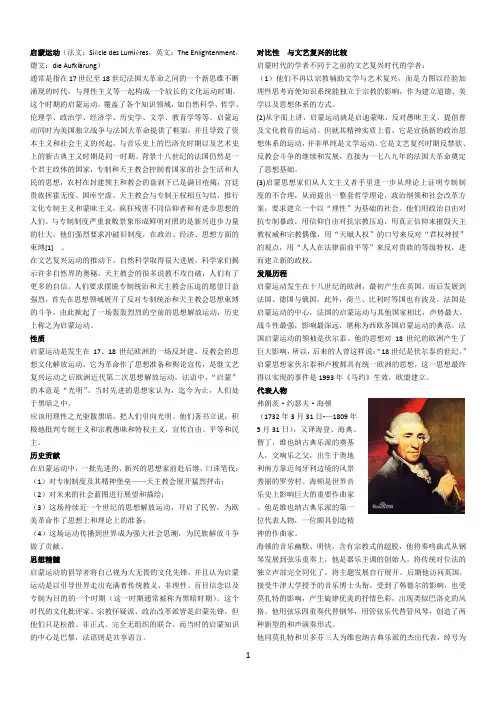
启蒙运动(法文:Siècle des Lumières,英文:The Enlightenment,德文:die Aufklärung)通常是指在17世纪至18世纪法国大革命之间的一个新思维不断涌现的时代,与理性主义等一起构成一个较长的文化运动时期。
这个时期的启蒙运动,覆盖了各个知识领域,如自然科学、哲学、伦理学、政治学、经济学、历史学、文学、教育学等等。
启蒙运动同时为美国独立战争与法国大革命提供了框架,并且导致了资本主义和社会主义的兴起,与音乐史上的巴洛克时期以及艺术史上的新古典主义时期是同一时期。
背景十八世纪的法国仍然是一个君主政体的国家,专制和天主教会控制着国家的社会生活和人民的思想,农村在封建领主和教会的盘剥下已是满目疮痍,宫廷贵族挥霍无度、国库空虚。
天主教会与专制王权相互勾结,推行文化专制主义和蒙昧主义,疯狂残害不同信仰者和有进步思想的人们。
与专制制度严重衰败景象形成鲜明对照的是新兴进步力量的壮大,他们强烈要求冲破旧制度,在政治、经济、思想方面的束缚[1] 。
在文艺复兴运动的推动下,自然科学取得很大进展,科学家们揭示许多自然界的奥秘,天主教会的很多说教不攻自破,人们有了更多的自信。
人们要求摆脱专制统治和天主教会压迫的愿望日益强烈,首先在思想领域展开了反对专制统治和天主教会思想束缚的斗争,由此掀起了一场轰轰烈烈的空前的思想解放运动,历史上称之为启蒙运动。
性质启蒙运动是发生在17、18世纪欧洲的一场反封建、反教会的思想文化解放运动,它为革命作了思想准备和舆论宣传,是继文艺复兴运动之后欧洲近代第二次思想解放运动。
法语中,“启蒙”的本意是“光明”。
当时先进的思想家认为,迄今为止,人们处于黑暗之中,应该用理性之光驱散黑暗,把人们引向光明。
他们著书立说,积极地批判专制主义和宗教愚昧和特权主义,宣传自由、平等和民主。
历史贡献在启蒙运动中,一批先进的、新兴的思想家前赴后继,口诛笔伐:(1)对专制制度及其精神堡垒——天主教会展开猛烈抨击;(2)对未来的社会蓝图进行展望和描绘;(3)这场持续近一个世纪的思想解放运动,开启了民智,为欧美革命作了思想上和理论上的准备;(4)这场运动传播到世界成为强大社会思潮,为民族解放斗争做了贡献。

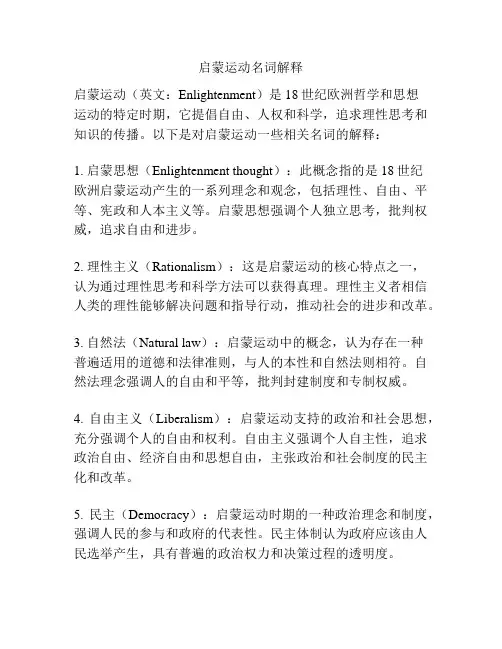
启蒙运动名词解释启蒙运动(英文:Enlightenment)是18世纪欧洲哲学和思想运动的特定时期,它提倡自由、人权和科学,追求理性思考和知识的传播。
以下是对启蒙运动一些相关名词的解释:1. 启蒙思想(Enlightenment thought):此概念指的是18世纪欧洲启蒙运动产生的一系列理念和观念,包括理性、自由、平等、宪政和人本主义等。
启蒙思想强调个人独立思考,批判权威,追求自由和进步。
2. 理性主义(Rationalism):这是启蒙运动的核心特点之一,认为通过理性思考和科学方法可以获得真理。
理性主义者相信人类的理性能够解决问题和指导行动,推动社会的进步和改革。
3. 自然法(Natural law):启蒙运动中的概念,认为存在一种普遍适用的道德和法律准则,与人的本性和自然法则相符。
自然法理念强调人的自由和平等,批判封建制度和专制权威。
4. 自由主义(Liberalism):启蒙运动支持的政治和社会思想,充分强调个人的自由和权利。
自由主义强调个人自主性,追求政治自由、经济自由和思想自由,主张政治和社会制度的民主化和改革。
5. 民主(Democracy):启蒙运动时期的一种政治理念和制度,强调人民的参与和政府的代表性。
民主体制认为政府应该由人民选举产生,具有普遍的政治权力和决策过程的透明度。
6. 科学方法(Scientific method):启蒙运动鼓励运用科学方法和推理来解决问题和寻求真理,强调通过观察、实验证实和逻辑推理来获取知识。
科学方法的运用被视为推动社会和科技进步的重要工具。
7. 进步(Progress):启蒙运动追求社会、政治和科技上的进步,强调人类可以通过理性思考和改革实现社会的改善和发展。
进步思想相信人类社会逐渐趋向于更公正、平等和文明的状态。
8. 教育(Education):启蒙运动主张普及教育,认为教育是培养理性和自由思考的关键,促进个人和社会的进步。
启蒙思想家提倡普及教育机会,鼓励人们追求知识和教育自己。
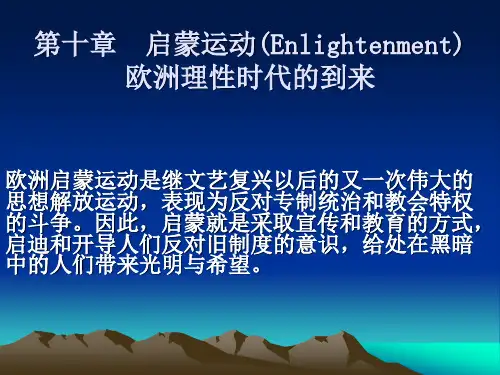
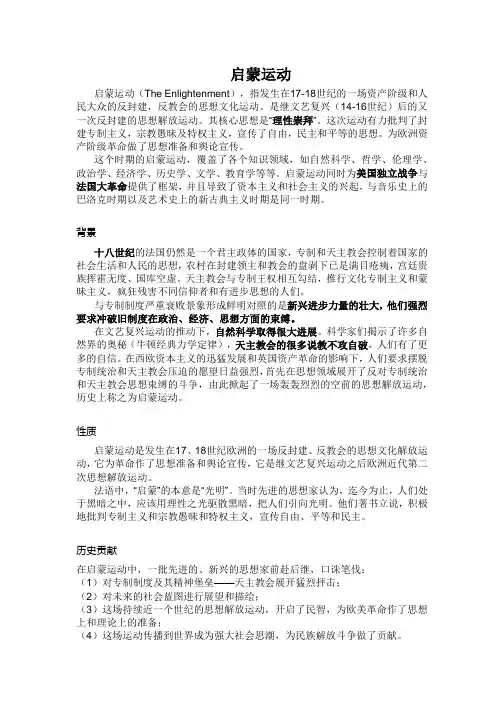
启蒙运动启蒙运动(The Enlightenment),指发生在17-18世纪的一场资产阶级和人民大众的反封建,反教会的思想文化运动。
是继文艺复兴(14-16世纪)后的又一次反封建的思想解放运动。
其核心思想是“理性崇拜”。
这次运动有力批判了封建专制主义,宗教愚昧及特权主义,宣传了自由,民主和平等的思想。
为欧洲资产阶级革命做了思想准备和舆论宣传。
这个时期的启蒙运动,覆盖了各个知识领域,如自然科学、哲学、伦理学、政治学、经济学、历史学、文学、教育学等等。
启蒙运动同时为美国独立战争与法国大革命提供了框架,并且导致了资本主义和社会主义的兴起,与音乐史上的巴洛克时期以及艺术史上的新古典主义时期是同一时期。
背景十八世纪的法国仍然是一个君主政体的国家,专制和天主教会控制着国家的社会生活和人民的思想,农村在封建领主和教会的盘剥下已是满目疮痍,宫廷贵族挥霍无度、国库空虚。
天主教会与专制王权相互勾结,推行文化专制主义和蒙昧主义,疯狂残害不同信仰者和有进步思想的人们。
与专制制度严重衰败景象形成鲜明对照的是新兴进步力量的壮大,他们强烈要求冲破旧制度在政治、经济、思想方面的束缚。
在文艺复兴运动的推动下,自然科学取得很大进展。
科学家们揭示了许多自然界的奥秘(牛顿经典力学定律),天主教会的很多说教不攻自破,人们有了更多的自信。
在西欧资本主义的迅猛发展和英国资产革命的影响下,人们要求摆脱专制统治和天主教会压迫的愿望日益强烈,首先在思想领域展开了反对专制统治和天主教会思想束缚的斗争,由此掀起了一场轰轰烈烈的空前的思想解放运动,历史上称之为启蒙运动。
性质启蒙运动是发生在17、18世纪欧洲的一场反封建、反教会的思想文化解放运动,它为革命作了思想准备和舆论宣传,它是继文艺复兴运动之后欧洲近代第二次思想解放运动。
法语中,“启蒙”的本意是“光明”。
当时先进的思想家认为,迄今为止,人们处于黑暗之中,应该用理性之光驱散黑暗,把人们引向光明。
他们著书立说,积极地批判专制主义和宗教愚昧和特权主义,宣传自由、平等和民主。
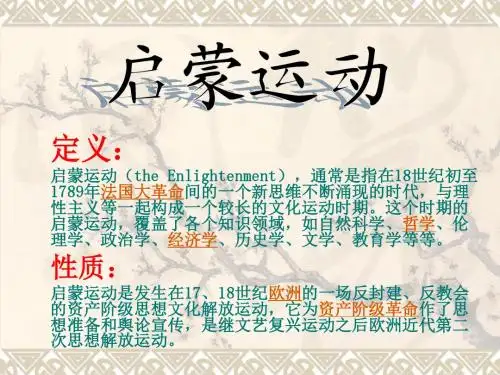

启蒙运动思想对西方文学的影响第一章:启蒙运动的背景和意义启蒙运动(Enlightenment)是发生在18世纪欧洲的一场思想革命。
它以理性为基础,主张人性本善,追求科学和文化的进步。
这场运动对欧洲社会产生了深刻的影响,延续到今日,成为了现代欧洲文化的基础之一。
启蒙运动的产生背景和历史条件是十分重要的。
当时,欧洲正在经历一些重大的变革,如工业革命、农业革命等。
这些变革推动着欧洲社会的发展和进步,但也带来了诸多的问题,如社会矛盾、贫富差距等。
这些问题让人们开始反思传统的思想观念和制度,进而探寻更加人性化和合理的社会构建方法。
正是在这样的背景下,启蒙运动产生了。
启蒙运动的意义不仅在于它所提出的一系列新思想,更在于它对欧洲文化的重构。
启蒙运动更加重视个人的尊重和人权保护,让人的意识和自我价值得到了提升。
同时,启蒙运动也是文化多元性的重要标志,它打破了传统文化的桎梏,让人们能够更加自由地表达自己的思想。
第二章:启蒙运动思想对西方文学的影响启蒙运动的思想深刻地影响了西方文学发展的方向和内容。
下面就从主题、形式、哲学思想三个方面来探讨启蒙运动对西方文学的影响。
主题影响在启蒙运动的影响下,人们开始更加关注现实社会问题。
这种关注也反映在文学作品中。
启蒙主义小说关注人性的刻画和社会伦理的探讨。
在这些小说中,莫里哀、斯威夫特等将现实社会的黑暗一一呈现,用精湛的文笔揭示人性本质的恶劣。
同时,启蒙主义小说也注重人性的救赎和修炼,试图用小说的形式向人们展现正义和善良的力量。
在启蒙运动的思想下,对于人性的观念也发生了变化。
人可以通过教育、文化的提升,不断追求美好和真理。
这一思想影响了文学作品中人物的命运安排和价值认知。
大量的作品中呈现的都是人物通过努力和改变,最终克服困难、活出尊严的故事。
文艺作品成为了启蒙教育的重要工具,反映了人类的精神追求。
形式影响在形式上,启蒙运动对文学的影响最突出的体现就是长篇小说形式的应用。
在启蒙时期,小说在欧洲的发展达到了空前的高峰,这也与文化、经济的发展有关。
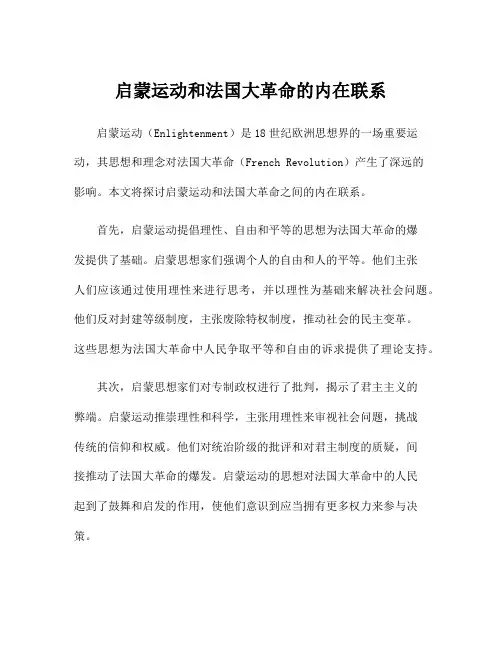
启蒙运动和法国大革命的内在联系启蒙运动(Enlightenment)是18世纪欧洲思想界的一场重要运动,其思想和理念对法国大革命(French Revolution)产生了深远的影响。
本文将探讨启蒙运动和法国大革命之间的内在联系。
首先,启蒙运动提倡理性、自由和平等的思想为法国大革命的爆发提供了基础。
启蒙思想家们强调个人的自由和人的平等。
他们主张人们应该通过使用理性来进行思考,并以理性为基础来解决社会问题。
他们反对封建等级制度,主张废除特权制度,推动社会的民主变革。
这些思想为法国大革命中人民争取平等和自由的诉求提供了理论支持。
其次,启蒙思想家们对专制政权进行了批判,揭示了君主主义的弊端。
启蒙运动推崇理性和科学,主张用理性来审视社会问题,挑战传统的信仰和权威。
他们对统治阶级的批评和对君主制度的质疑,间接推动了法国大革命的爆发。
启蒙运动的思想对法国大革命中的人民起到了鼓舞和启发的作用,使他们意识到应当拥有更多权力来参与决策。
第三,启蒙运动在社会和思想上对贵族和教会的特权进行了挑战。
启蒙思想家们强调个体的权利和独立,反对专制政权和特权制度的滥权。
他们批评教会的虚伪和对民众的控制,并提出人民应该拥有自由信仰和思想的权力。
法国大革命中的人民也反对贵族的特权和教会的压迫,他们追求自由和平等的权利,向这些特权力量发起了决然的挑战。
第四,启蒙运动让普通民众开始意识到自己的力量和权利,引发了他们要求参与政治决策的愿望。
启蒙思想家们强调个人的权利和责任,主张人民应当参与政治生活,推动社会变革。
这一思想影响了法国民众,他们开始发声,要求参与政治决策的权利,推动社会制度的改革。
法国大革命中的人们要求普遍的选举权和公正的司法制度,这些诉求直接来源于启蒙思想家的理念。
最后,启蒙运动对法国大革命产生了深远的影响,法国大革命也将启蒙运动的思想推向了更为激进和彻底的层面。
法国大革命中的人们通过暴力手段推翻了君主制度,并试图建立一个理性和平等的社会。
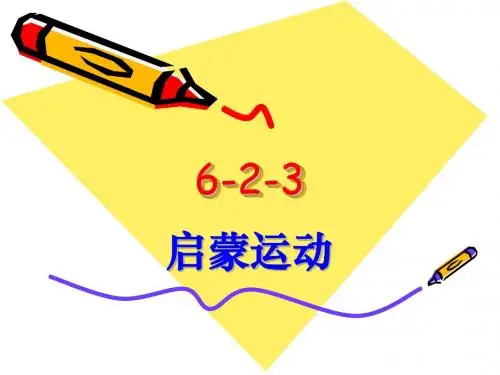
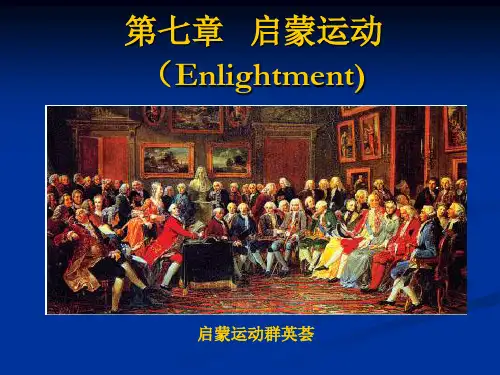
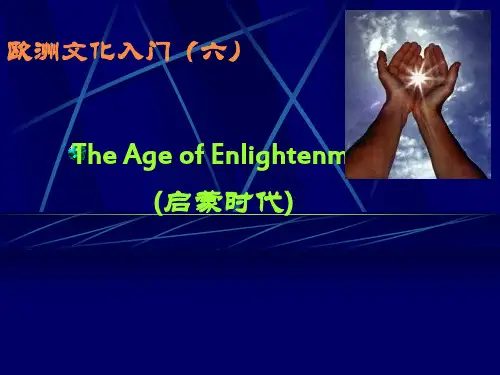
考纲C层次之十启蒙运动(enlightenment)一、启蒙运动概况:1、产生背景:西欧资本主义的发展,资产阶级的壮大要求剥去封建制度的神圣外衣;自然科学的突飞猛进为破除迷信、批判蒙昧提供新的思想武器。
2、发展阶段:17世纪兴起于英国,18世纪法国成为运动的中心,把启蒙运动推向高潮,而后扩展到全世界。
3、核心内容:(1)否定教会权威和盲目信仰,提倡进步和理性;(2)从自然法和社会契约学说入手,否定封建专制,宣扬天赋人权和人民主权;(3)从天赋人权入手,宣扬人生而自由、平等;(4)普遍赞同君主立宪,主张建立合乎理性的社会和国家,构建了资本主义国家的基本政治制度;总之启蒙运动批判专制主义、教权主义和等级制,追求个人自由、政治民主和权利平等。
4、性质:启蒙运动是继文艺复兴之后欧洲新一轮的资产阶级反封建专制、反教会权威的思想解放运动。
5、影响:进步性:①启蒙思想家向封建势力发起猛烈冲击,传播了(自由、民主、平等)等进步思想,从根本上动摇了封建统治的思想基础;②为即将到来的美、法等国资产阶级革命提供了理论依据,进行了舆论动员;③为后世的殖民地、半殖民地人民争取民族独立和人民的自由、民主、平等提供了思想武器;④也为资本主义国家提供了系统的政治构想。
时代局限(阶级分析法,仅供参考):现在我们知道,这个理性的王国不过是资产阶级的理想化的王国;永恒的正义在资产阶级的司法中得到实现;平等归结为法律面前的资产阶级的平等;被宣布为最主要的人权之一的是资产阶级的所有权;而理性的国家、卢梭的社会契约在实践中表现为而且也只能表现为资产阶级的民主共和国。
18世纪的伟大思想家们,也和他们的一切先驱者一样,没有能够超出他们自己的时代所给予他们的限制。
——恩格斯《反杜林论》附1、思考:从人文主义起源到科学理性时代经历了哪些重大事件?①萌芽:希腊先哲,强调人的尊严和价值,西方人文主义精神的起源②兴起:文艺复兴,高举“人文主义”大旗,冲击宗教神学世界观。
思想启蒙运动的名词解释思想启蒙运动(Enlightenment)指的是18世纪欧洲兴起的一股文化和思想运动,旨在推动人类从迷信和封建主义的桎梏中解放出来,追求自由、平等和知识的普及。
这一运动对于整个西方世界的政治、社会、科学和文化发展产生了深远的影响。
首先,思想启蒙运动强调个人主义和人权。
在旧有的封建社会体制下,个人的权利和自由受到极大限制。
思想启蒙运动倡导在政治、社会和法律上给予每个人平等的待遇和机会。
这种观点对后来的法国大革命和美国独立战争产生了重要的影响。
其次,思想启蒙运动追求科学和理性思考的普及。
启蒙时代出现了许多知识分子和思想家,他们批判传统的教义和迷信观念,坚信人类通过理性思考和科学方法可以获得真实的智慧。
这一思潮为科学革命的发展和现代科学的兴起提供了思想基础。
思想启蒙运动还倡导对君主制和专制主义的批判。
在启蒙时代,绝对君主制在欧洲大陆盛行,国王拥有几乎无限的权力。
但启蒙运动提出了民主和宪政的观点,主张将政治权力限制在一定的范围内,以保障公民的权利和自由。
这种观念对后来欧洲的民主化和法治的发展产生了积极的促进作用。
另外,思想启蒙运动还对社会不平等和压迫进行了批判。
启蒙时代,社会阶级分化严重,贵族享有特殊权益,而普通民众则饱受苦难。
思想启蒙运动主张建立一个更加公正和平等的社会秩序,旨在消除贵族特权和资本主义剥削,实现社会的进步和公平。
为了推广思想启蒙运动的理念,许多启蒙作家和哲学家发表了大量的著作。
其中最为著名的有法国的伏尔泰、卢梭和孟德斯鸠,英国的洛克和休谟,以及德国的康德等。
他们通过文字倡导自由、平等和智慧,并对当时的社会和政治制度提出了批评和建议。
然而,思想启蒙运动也受到了一些限制和挑战。
由于当时的君主制政权和教会的强大力量,一些思想家得以发表自己的著作,但也有许多被迫在暗中行事或流亡他国。
此外,启蒙运动的理念并未得到广泛的认同和实践,许多社会问题和不平等仍然存在。
总之,思想启蒙运动是欧洲历史上一场重要的思想和文化运动。
enlightment名词解释
Enlightenment(启蒙运动)是18世纪欧洲兴起的一场哲学和文化运动,主张通过理性、自由和平等来解决思想和社会的问题。
启蒙运动是欧洲近代思想文化和社会变革的重要阶段之一,对于西方思想、政治、经济、艺术和教育产生了深远的影响,也具有全球性的意义。
启蒙运动的思想核心包括以下几个方面:1.理性主义:启蒙运动强调通过理性的思考和推理来认识事物,主张批判传统的认识方法和信仰,坚信人的理性能够在知识领域获得真正的进步。
2.自由主义:启蒙运动主张个人自由和人权,反对一切形式的专制和统治,特别是宗教、政治和社会的等级制度。
3.平等主义:启蒙运动秉承“人人生来平等”的原则,反对一切形式的身份歧视和社会不公,主张消除阶级差距和贵族特权。
4.科学主义:启蒙运动认为科学是人类认识世界和改造世界的主要手段,主张发扬科学精神和理性思维,推进科学技术领域的发展。
启蒙运动对西方现代文明的走向有着深远的影响,它促进了科学和启蒙教育的发展,推动了民主和人权的进步,同时也对世界其他地区产生了影响和启示,为人类文明的发展作出了重要贡献。
启蒙运动名词解释启蒙运动是一场发生在 17 世纪至 18 世纪的欧洲社会文化运动,旨在推动理性思考、个人权利和平等的理念。
这场运动涉及了哲学、文学、艺术、政治等领域,对欧洲乃至世界的历史产生了深远的影响。
下面是本店铺为大家精心编写的4篇《启蒙运动名词解释》,供大家借鉴与参考,希望对大家有所帮助。
《启蒙运动名词解释》篇1启蒙运动(Enlightenment Movement)是指 17 世纪至 18 世纪欧洲社会文化领域的一场重要运动。
该运动的核心理念是理性思考、个人权利和平等。
在这场运动中,哲学家、文学家、艺术家、政治家们提出了一系列重要的思想,对当时的政治、经济、文化等各个领域产生了深远的影响。
启蒙运动的起源可以追溯到 17 世纪的英国。
当时,约翰·洛克(John Locke)提出了社会契约论和天赋人权说,为个人权利的平等提供了理论基础。
弗朗西斯·培根(Francis Bacon)提倡经验主义和科学方法,为理性思考打开了道路。
18 世纪,法国的伏尔泰(Voltaire)、卢梭(Rousseau)等人将启蒙思想发扬光大,提出了一系列重要的政治哲学观点,如言论自由、宗教自由、平等权利等。
启蒙运动涉及的领域非常广泛,除了哲学、政治外,还涉及到文学、艺术、科学等方面。
在文学方面,启蒙文学倡导的是理性、科学、自由和平等的精神,反对封建迷信和狭隘的教条主义。
在艺术方面,启蒙运动带来了新古典主义风格的兴起,强调理性和完美。
在科学方面,启蒙运动推动了实验科学方法的发展,为后来的工业革命和科学进步奠定了基础。
启蒙运动对欧洲乃至世界的历史产生了深远的影响。
在政治上,启蒙思想为后来的美国和法国革命提供了重要的理论根据。
在文化上,启蒙运动为欧洲文化的多元化和自由化奠定了基础。
在科学上,启蒙运动为实验科学方法和科学进步提供了推动力。
《启蒙运动名词解释》篇2启蒙运动(The Enlightenment)是指发生在 17-18 世纪的一场资产阶级和人民大众的反封建、反教会的思想文化运动。
启蒙运动对欧美发展的影响
古典启蒙运动(Enlightenment Movement)是一种18世纪中期
以欧洲为中心的文化运动,旨在使公众思想从基督教传统中解放出来,倡导独立的人的理性自由主义思想。
古典启蒙运动对欧美的发展产生
了深远的影响。
首先,古典启蒙运动肯定了科学研究,这为欧美发明和创新提供
了可能性。
其次,它开拓了思想自由广阔的天地,指出人类有拥有唯
一自由和权利的观点,这种思想被用于形成了欧洲的实行民主的国家。
最后,它鼓励国家发展为一个文化国家,以扩大对知识和艺术的热爱,提高人民文化水平,改变了欧美社会文化环境。
总之,古典启蒙运动对欧美社会发展产生了积极及深远的影响。
它推广了人文主义思想,鼓励科学研究,推动了欧美实行民主制度,
改善了欧美社会文化水平,使得欧美发展到今天的地步。
EnlightenmentThe Age of Enlightenment (or simply the Enlightenment or Age of Reason) was an elite cultural movement of intellectuals in 18th century Europe that sought to mobilize the power of reason in order to reform society and advance knowledge. These thinkers believed that human reason could be used to combat ignorance, superstition, and tyranny and to build a better world. Their principal targets were religion (embodied in France in the Catholic Church) and the domination of society by a hereditary aristocracy.Roots of Enlightenment1)Renaissance - view of man as worthy of admiration and capable of progress.2)Scientific Revolution – Reason and rationality helped Europe understandthe planets and the cosmological order. Therefore, reason can also help usunderstand society (e.g., politics, economics, religion, law etc.) and help us to make it better. The belief that reason can lead to progress in society is an important Enlightenment idea.3)Wars of Religion – The many wars fought over religion exhausted Europeand made these thinkers attack religious dogma’s and emphasize the need for religious toleration. (W e can’t kill everyone that has a different religion, therefore let us learn to live with them). This toleration will eventually beextended to include political, gender and racial differences as well offreedom of thought and differing opinions. (basic human rights)What these thinkers wanted to oppose:1)Intolerance2)Ignorance3)Religious fanaticism4)Barbarism (torture)5)Despotism (absolute monarchy and dictatorships)6)Anything that remained of Medieval Europe or the “dark ages”Important Enlightenment thinkers:1)Denis Diderot (1713 – 1784) Editor of the first encyclopedia. He was tryingto map out or record all human knowledge. He held the enlightenmentideal that mankind, through rationality, can explain everything.2)John Locke (1632 – 1704) An important British philosopher who pioneeredthe idea of the social contract. This says that all governments get theirauthority from the consent and will of the people. The government issupposed to protect the people’s right to life, liberty and property. When it fails to do this or demands too much power, then the people have a right to rebel against it. Locke supported a constitutional government that putslimit on the top authority. He was one of the main critics against absolutemonarchs like Bourbon kings of France.Locke also believed that the goal of a rational society was to allow itspeople to pursuit happiness. All people want to be healthy, enjoy love, have shelter, and develop their own ideas or pursuit their own goals. Locke said it was the goal of government to allow people to do this and improve thelives of its citizens.He also believed that people were not born fixed into a nature (like Middle Ages) but were a table Rasa (blank slate). It you teach them well they willgrow to be good. If they a influenced towards evil they will develop thatway (nature vs. nurture). So he exemplifies the Enlightenment ideal ofeducation for all.3)Voltaire (1694 – 1778) Proponent of civil liberties like freedom of religionand freedom of thought. He constantly attacked all outmoded beliefs thatlingered from the Middle Ages (e.g., superstition and the use of torture). He was a very strong critic of religion.4)Adam Smith (1723 – 1790) An economist who is regarded as the father ofcapitalism. In his famous book The Wealth of Nations he put forward theidea that economies run best when it is left alone and that governmentsshould mostly keep its hands off. People pursuing what is best forthemselves individually will also be good for society and the country.(example: a Butcher doesn’t cut meat out of regard for society but out ofhis own pursuit of a livelihood. But in pursuing his own interest, he alsoadvances the interests of society).New World (Columbian exchange) influence on Europe:Tobacco, chocolate, corn, potatoes, peanuts, vanilla, tomatoes, pineapples, sweet and chili peppers, turkey, (chewing) gum, sugar, syphilis.French RevolutionCauses:1)Poor Leadership – Decades of overspending on palaces, luxuries and wars.(Absolute) monarchs who are incapable/uninterested in ruling France.2)Corrupt tax laws – The starving peasants are overtaxed while the nobilitypay no taxes at all. There is lots of waste in the tax system as private taxcollectors keep (steal) much of the money for themselves.3)Rise of the Bourgeoisie (middle class) – They have most of the money andproductive capital of France. But they have no political voice. They will belargely in support of overthrowing the old regime.4)Enlightenment ideas – limits on authority.5)American revolution - France seeking a similar government.Events that lead to the Revolution:Estates General (1789) – France is bankrupt so the king calls together a session of congress to ask for more tax revenue. On June 17th, the 3rd estate breaks away (peasants want tax relief, Bourgeoisie want more political power) and calls itself the “national assembly of France”. Three days later, agents of the king try locking them out of the as sembly. They all meet in a tennis court and take the “tennis court oath”, which said they will not disband until they adopt a new constitution for France that limits the power of the king and gives them more equal representation. Louis XVI gives in to them and orders the first 2 estates to join them as a new congress.Storm of Bastille (July 14th, 1789) – Louis XVI has amassed lots of troops to help protect his power. Rumors circulate that he will disband the national assembly byforce. Mobs in Paris storm the Bastille (fortress) and release political prisoners. Later that year, a mob takes over Versailles and watch the king so he cannot overthrow the new power of the national assembly. National Assembly passes the “declaration of the rights of man”Declaration of the rights of Man:1)All men born free and equal.2)Freedom of speech, freedom of the press, freedom of assembly3)Freedom of Religion4)Right to petition government5)Freedom from arbitrary arrest and imprisonment6)Declares all power derived from the people and not from God or from theking.7)The king is forced to agree to a separation of powers (judiciary, legislativeand executive branch).The period from 1789 to 1791 is known as the first phase (or moderate phase) of the revolution. The 2nd phase of the revolution was chaotic and violent. Political clubs form that want more radical reforms (e.g., Jacobins). They will take control of the assembly (led by 3 men: Maximilien Robespierre, Jean-Paul Marat, and Georges Danton.War declared (April 1792) – Other countries in Europe (Austria and Prussia first, later Britain and Portugal) will go to war with France. They want to intervene and uphold the monarchy. Radical groups in France use the fear of war to push own agenda. They abolish the monarchy.King Louis XVI executed (January 1793) – The king is put on trial and declared a counter revolutionary. He is executed by guillotine. This shocks Europe and starts a new bloody phase known as the “reign of terror”. A new committee called the “committee of public safety” hold trials and executes thousands that are considered counter-revolutionary. Robespierre will gain power and have Marat and Danton killed. Anyone accused ended up executed, extreme violence is justified to defend the revolution. Many nobles and moderate leaders are killed.Everyone is afraid of the reign of terror and Robespierre. He is arrested and executed.Power Vacuum – Many leading men of France are dead from war or execution. There is a lack able men to lead France. Napoleon Bonaparte, an able general during the war, is called in to quell a riot. He uses this event to take control of France and declare himself dictator or France.The French revolution will help to bring an end to absolute monarchy in France. Eventually, most governments will become constitutional monarchies or republics.。